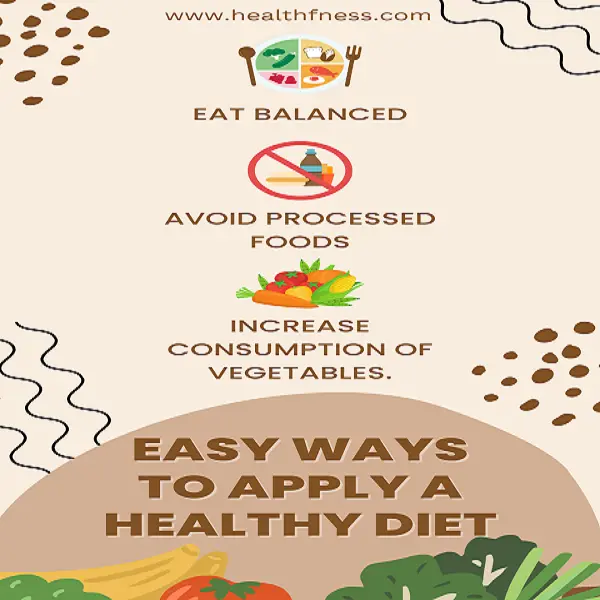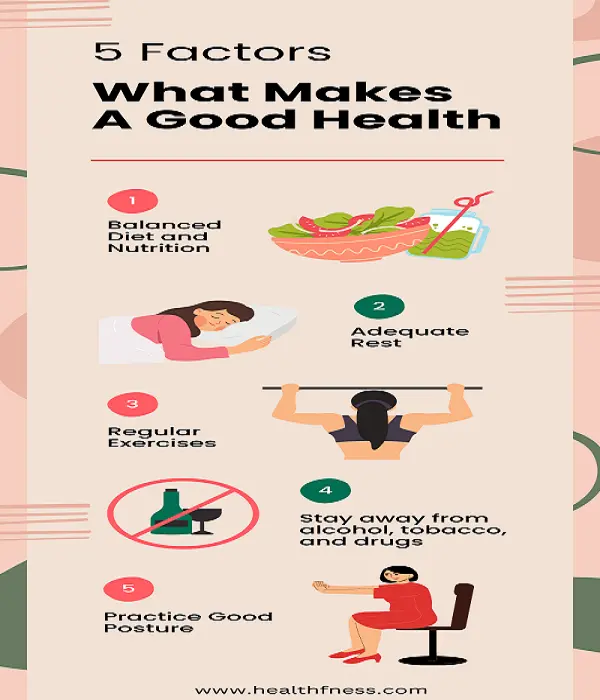A balanced diet comprises all of the essential nutrients in the proper quantities to promote maximum health and well-being. A well-balanced diet should include enough carbohydrates, proteins, fats, vitamins, minerals, and fiber to meet the body’s daily requirements.

A well-balanced diet includes items from all main food groups, including fruits and vegetables, grains, lean meats, and healthy fats. Depending on age, gender, exercise level, and health status, the proportion of each food group may vary.
A balanced diet can help you maintain a healthy weight, lower your risk of chronic diseases like heart disease, diabetes, and some malignancies, and improve your overall physical and mental health.
Importance Of A Balanced Diet
A well-balanced diet is essential for overall health and the prevention of chronic diseases. These are some major ideas concerning the significance of a healthy diet:
Nutrient Intake
A balanced diet contains all of the important nutrients that the body
need, such as carbs, proteins, fats, vitamins, minerals, and fiber. Each nutrient serves a unique purpose in the body, and a lack of any nutrient might result in health concerns.
Healthy Body Weight
A balanced diet helps to maintain a healthy body weight by supplying the appropriate quantity of energy for everyday activities. Following a well-balanced diet will help you avoid overeating and undereating, both of which can result in weight gain or reduction.
Disease Prevention
A balanced diet helps lower the risk of chronic diseases such as heart disease, stroke, diabetes, and several malignancies. A diet high in fruits, vegetables, whole grains, lean meats, and healthy fats can help lower blood pressure, cholesterol, and inflammation, all of which are risk factors for chronic diseases.
Mental Health
A balanced diet can help with mental health and well-being. Omega-3 fatty acids, B vitamins, and magnesium have all been linked to better mood and a lower incidence of sadness and anxiety.
Overall Health And Well-being
By providing the body with the nutrients it requires to function effectively, a balanced diet can boost overall health and well-being. Consuming a well-balanced diet can boost energy, improve digestion, and boost the immune system.
A balanced diet is critical for overall health and the prevention of chronic diseases. You may improve your general health and well-being by consuming a variety of nutrient-rich foods from all of the major food groups.
Some studies show that people who take Balanced Diet have a lot of health benefits.
What is A Well-Balanced And Sufficient Complementary Diet?
A supplementary diet is a food that is provided to newborns and young children in addition to breastfeeding or formula milk in order to meet their growing nutritional needs. Healthy growth and development, as well as the prevention of malnutrition and micronutrient deficiencies, require a balanced and suitable complementary diet. We will cover the nutritional requirements, suggested food types and portion sizes, and the importance of variety in a balanced and adequate supplementary diet in this post.
Nutritional Requirements:
A balanced and appropriate supplemental diet should supply all of the important nutrients required for newborns and young children to grow and develop. Protein, carbs, lipids, vitamins, minerals, and fiber are examples of nutrients. Protein is required for tissue growth and repair, whereas carbs and lipids offer energy for daily activities. Vitamins and minerals are required for a variety of body activities, including immune function and bone health, while fibre aids digestion.

Recommended Food Groups And Portion Sizes
It is critical to incorporate a range of meals from different food categories to ensure that newborns and young children have a balanced and appropriate complementary diet. These food groupings are as follows:
Fruits and vegetables: These foods are high in vitamins, minerals, and fiber. They should be consumed in a range of hues and textures. Per meal, one small fruit, half a cup of diced fruit, or half a cup of cooked vegetables is recommended.
Grains: Grains include both energy and fiber. Whole grains are favored over refined grains, such as brown rice, whole wheat bread, and oatmeal. One piece of bread, half a cup of cooked grains, or one small apple are all acceptable serving amounts.
Protein: Protein is required for tissue growth and repair. Meat, poultry, fish, eggs, beans, and tofu are all high in protein. Per meal, one to two ounces of meat, chicken, or fish, or one-fourth to one-half cup of beans, are recommended.
Dairy: Dairy products are high in calcium and other important minerals. Per meal, half a cup of milk, one small container of yogurt, or one ounce of cheese is recommended.
Importance Of Variety
To ensure that infants and young children obtain all of the important nutrients they require, a balanced and appropriate supplementary diet should include a variety of foods from different food groups. Providing a diversity of textures, flavors, and colors can aid in the development of a child’s taste preferences while also lowering the chance of vitamin deficiencies. Variety also prevents boredom and encourages children to explore new cuisines.
To summarise, balanced and appropriate complementary food is critical for newborns and young children’s healthy growth and development. It should contain all of the required nutrients, a variety of foods from various dietary groups, and suitable portion sizes. Parents and carers may give their children the best possible start in life by following these instructions.
Benefits Of A Balanced And Adequate Complementary Diet
A balanced and appropriate complementary food is critical for newborns and young children’s healthy growth and development. Here are some of the advantages of a well-balanced diet:
Improved Growth And Development
A balanced and appropriate complementary diet supplies the nutrients required for optimal growth and development in newborns and young children. Protein, carbs, and fats are required for tissue repair and energy, while vitamins and minerals are required for a variety of body processes such as bone formation and immune system function. A balanced and adequate supplemental food can enable newborns and young children to reach acceptable height and weight for their age and maintain healthy growth.
Improved Immune System Performance:
In newborns and early children, balanced and appropriate supplemental food helps increase immune system function. Sufficient protein, vitamins A, C, and E, as well as zinc, are required for proper immune system function. A well-balanced supplementary food can help newborns and young children develop a stronger immune system and minimize their risk of infection.
Lower Risk Of Malnutrition And Micronutrient Deficiencies
A balanced and appropriate supplemental diet helps minimize the risk of malnutrition and micronutrient deficiencies in newborns and young children. Malnutrition can cause stunted growth, decreased cognitive development, and a variety of other health issues. Iron deficiency anemia, for example, can induce fatigue, weakness, and decreased cognitive performance. A well-balanced and sufficient supplemental food can supply newborns and young children with the nutrients they need to avoid these illnesses.

Positive Impact On Cognitive Development And Academic Performance
A well-balanced and sufficient supplemental food can improve cognitive development and academic achievement in newborns and young children. Sufficient protein, iron, and B vitamins are necessary for brain development and function. A well-balanced and appropriate supplemental diet can aid in the development of cognitive skills, memory, and concentration in infants and early children, resulting in enhanced academic achievement.
Lowering The Risk Of Chronic Diseases
A well-balanced and sufficient supplemental diet can lower the chance of developing chronic diseases later in life. A diet is rich in fruits, vegetables, whole grains, and lean meats has been shown to reduce the risk of heart disease, stroke, diabetes, and some malignancies. Parents and carers can help establish healthy eating habits in newborns and young children by starting them on a balanced and appropriate complementary diet. This can minimize the risk of chronic diseases later in life.
Parents and carers may give their children the greatest possible start in life by following the recommended food groups and quantity sizes.
Chronic Illness Risk Is Increased
An unbalanced or insufficient supplementary diet can raise the chance of developing chronic diseases later in life. Obesity, heart disease, diabetes, and other chronic diseases can be caused by a diet heavy in processed foods, saturated fats, and added sugars. Parents and carers can build bad eating habits that can contribute to chronic diseases later in life by starting newborns and young children on an imbalanced or inadequate supplementary diet.
Strategies For Promoting A Balanced Diet
Providing well-balanced and sufficient complementary food is critical for healthy growth and development.
Campaigns For Education And Public Awareness
Education and awareness efforts can be quite effective in encouraging a well-balanced and adequate complementary diet. These ads can be directed at parents, carers, healthcare providers, and the general public. Education and awareness campaigns can provide information on the importance of a balanced and enough complementary diet, suggested food groups and portion sizes, and cooking methods for preserving food’s nutritional content. Such advertisements can also stress the risks of an imbalanced or insufficient supplementary diet, as well as the benefits of good nutrition for healthy growth and development.
Availability and Accessibility Of Nutritious Foods
The accessibility and availability of nutritious foods are crucial in promoting a balanced and appropriate supplementary diet. Governments and other stakeholders can collaborate to boost the availability and accessibility of nutrient-dense foods including fruits, vegetables, and legumes in local markets and grocery shops. Moreover, programs to subsidize the cost of these meals or provide vouchers to low-income families to purchase nutrient-dense foods can be developed. These activities can contribute to ensuring that all families have access to nutritious meals and can afford to include them in their diets.
Interventions In The Community
Community-based programs can be beneficial in encouraging a healthy, balanced diet. These interventions can be tailored to specific towns or areas, and they can include a wide range of stakeholders, such as healthcare practitioners, community leaders, and local organizations. Cooking classes, nutrition education programs, and peer support groups for parents and carers are examples of community-based treatments. Community-based interventions can help to promote good eating habits and enhance the nutritional status of infants and young children by interacting with the community and offering support and resources.
Governments, healthcare professionals, and other stakeholders can help to ensure that newborns and young children obtain the nutrients they need for healthy growth and development by following these methods.
FAQS
What exactly is a balanced diet?
A balanced diet is one that includes a range of foods from all of the major food groups in the proper amounts, giving the nutrients needed to sustain excellent health.
What are the different food groups?
Fruits, vegetables, grains, protein, and dairy are the major food groups. Each category supplies the necessary nutrients for appropriate growth and development.
What is the significance of a well-balanced diet?
A well-balanced diet is critical for excellent health, lowering the risk of chronic diseases, and promoting appropriate growth and development. It gives the body the nutrition, vitamins, and minerals it needs to function properly.
How much of each food group should I eat on a daily basis?
The daily portions for each food group differ depending on age, gender, and activity level. A healthy diet should include 2-3 servings of fruits and vegetables, 3-5 servings of vegetables, 6-8 servings of grains, 2-3 servings of protein, and 3 cups of dairy.
What are some examples of nutrient-dense foods?
Nutrient-dense foods are those that are high in nutrients while being low in calories. Leafy greens, berries, whole grains, lean meats, and low-fat dairy products are among the examples.
Can I still eat junk food while maintaining a healthy diet?
While some harmful foods can be included in a well-balanced diet, they must be consumed in moderation. Junk food is typically high in calories, sugar, and fat, and eating too much of it can result in weight gain and other health problems.
Is it necessary to take supplements if I follow a balanced diet?
It is normally unnecessary to take supplements if you eat a well-balanced diet that contains foods from all of the major food categories. Some people, however, may need supplements if they have specific dietary deficits or are unable to absorb adequate nutrients through their diet. Before taking supplements, always consult with a healthcare provider.
Conclusion
In conclusion, a well-balanced diet is essential for excellent health, lowering the risk of chronic diseases, and promoting normal growth and development. It gives the body the nutrition, vitamins, and minerals it needs to function properly. A well-balanced diet should include a range of foods from all of the major food categories in the appropriate amounts, supplying the nutrients required to sustain good health. A balanced and appropriate complementary diet can be promoted by adequate education and awareness campaigns, the availability and accessibility of nutritious foods, and community-based activities. It is critical to make healthy eating a lifestyle choice by eating nutrient-dense foods and avoiding harmful foods. A balanced diet can help you live a healthier and more meaningful life.
Video Credits:
If you have any confusion or questions related to this topic do Let Us Know😊

Dr. Mark Jenkins, MD - General Physician (California, USA)
Dr. Mark Jenkins is a board-certified general physician based in the United States, specializing in preventive medicine, nutrition, and lifestyle health. With years of clinical experience in primary care, he is dedicated to helping patients and readers alike make informed, science-based decisions about their well-being.
As a trusted medical reviewer and contributor to Healthfness.com, Dr. Jenkins ensures that all health content meets the highest standards of accuracy, safety, and evidence-based medicine. His expertise bridges modern medical science with practical, everyday wellness strategies, making complex topics approachable for all audiences.
Outside the clinic, Dr. Jenkins is passionate about living the healthy lifestyle he teaches. He enjoys hiking with his dog, experimenting with vegetarian cooking, and exploring the latest health research. He believes that small, consistent lifestyle changes lead to lasting health improvements, and he aims to inspire readers to take proactive steps toward a healthier, happier life.
Explore more of Dr. Jenkins’ evidence-based insights at Healthfness.com



